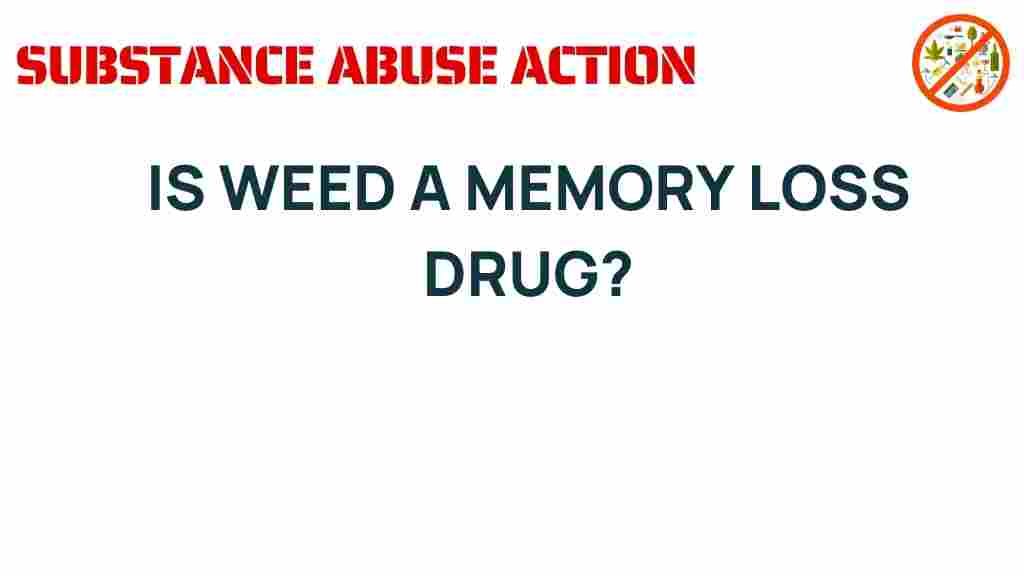The Hidden Impact of Weed: A Closer Look at Memory Loss
The conversation surrounding weed and its effects on health is more relevant than ever, especially as cannabis becomes increasingly legalized and normalized in various parts of the world. While many users celebrate the benefits of marijuana, particularly for pain relief and relaxation, there is a growing concern about its impact on memory loss and overall cognitive function. In this article, we dive deep into the effects of cannabis on brain health, exploring both the positive and negative implications of substance use.
Understanding Cannabis and Its Effects
Cannabis, commonly referred to as weed or marijuana, contains various compounds called cannabinoids. The most well-known of these is tetrahydrocannabinol (THC), which is responsible for the psychoactive effects that many users experience. Another significant cannabinoid is cannabidiol (CBD), which is often touted for its therapeutic benefits without the high associated with THC.
As cannabis use becomes more popular, it’s crucial to understand its effects on mental clarity and brain health. Research has shown that while cannabis may provide immediate relief from anxiety or pain, it can also lead to potential risks, particularly regarding cognitive functions such as memory.
The Science of Memory Loss Due to Cannabis Use
Memory is a complex cognitive function that relies on various brain processes. Studies have indicated that THC can affect these processes, leading to short-term and potentially long-term memory issues. Here are some key points to consider:
- Short-term memory effects: THC can impair short-term memory, making it difficult to learn new information or recall recent events.
- Long-term use implications: Prolonged use of cannabis has been linked to more severe memory deficits and cognitive decline, particularly in younger users whose brains are still developing.
- Age factors: The impact of weed on memory may vary with age, with younger users experiencing more pronounced effects compared to older adults.
How Cannabis Affects Different Types of Memory
Memory can be categorized into different types, and cannabis can affect these in various ways:
- Working Memory: This type of memory is crucial for reasoning and decision-making. Studies suggest that THC can impair working memory, making it challenging to process information effectively.
- Episodic Memory: This involves recalling specific events or experiences. Cannabis use has been shown to disrupt the ability to remember personal experiences.
- Procedural Memory: This type involves skills and tasks. Interestingly, some studies suggest that while cannabis may impair certain memory functions, it might not significantly affect procedural memory, which involves learned skills.
Health Risks Associated with Cannabis Use
While many advocate for the medical benefits of cannabis, it’s essential to acknowledge the health risks associated with its use:
- Cognitive Decline: Regular use of weed can lead to cognitive decline, especially in adolescents and young adults.
- Increased Anxiety and Depression: Some users report that cannabis can exacerbate anxiety and depressive symptoms, potentially leading to more significant mental health issues.
- Dependency Issues: Regular use can lead to dependency, with withdrawal symptoms that may include cognitive impairments.
Cannabis and Brain Health: What the Research Says
Research on the effects of cannabis on brain health is still evolving. However, several studies provide insight into how marijuana impacts cognitive function:
- A meta-analysis found that heavy cannabis users had poorer cognitive performance compared to non-users.
- Longitudinal studies indicate that early onset of cannabis use is correlated with a decline in IQ over time.
- Research has shown that cannabis use can lead to structural changes in the brain, particularly in areas associated with memory and learning.
Steps to Mitigate the Effects of Weed on Memory
For those who choose to use cannabis, there are steps that can be taken to minimize its impact on memory and cognitive function:
- Limit Usage: Reducing the frequency and amount of cannabis consumed can help mitigate memory loss.
- Choose Strains Wisely: Some strains of cannabis are higher in CBD, which may counteract some of the negative effects of THC. Opting for these strains might be beneficial.
- Engage in Cognitive Exercises: Activities such as puzzles, reading, or learning new skills can help strengthen memory and cognitive function.
- Maintain a Healthy Lifestyle: A balanced diet, regular exercise, and adequate sleep are essential for optimal brain health.
Troubleshooting Memory Loss Related to Cannabis
If you or someone you know is experiencing memory loss that you suspect may be related to cannabis use, consider the following troubleshooting tips:
- Reduce Frequency of Use: Gradually reduce the amount and frequency of cannabis consumption to assess any improvement in memory function.
- Consult a Healthcare Professional: Seeking advice from a medical professional can provide personalized guidance and support.
- Explore Alternative Therapies: Consider other therapies or medications that can offer relief without the cognitive side effects associated with cannabis.
Conclusion: The Need for Awareness
The impacts of weed on memory loss and cognitive function are significant and warrant careful consideration. While cannabis may provide therapeutic benefits for some, it is crucial to be aware of the potential risks to brain health. As the legalization and use of marijuana continue to rise, education and awareness regarding its effects become increasingly vital.
For further reading on cannabis and its effects on mental health, you can refer to this resource. Always consult with a healthcare provider to make informed decisions regarding cannabis use and its impact on your health.
Understanding the relationship between marijuana, memory loss, and cognitive function is essential for anyone considering its use. By staying informed, users can make better choices and protect their mental clarity and overall brain health.
This article is in the category Health and created by SubstanceAbuseAction Team
